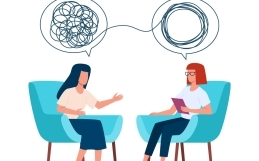
“And I know the adventures to be had on these journeys are not about the confirmation of what is already known, but about expeditions into what is possible for people to know about their lives.”
–Michael White
What to do when self vanishes
All of the sudden the thought came to me: “Oh crap. I’m 30…what am I doing with my life?” The realization hit me—no, really, it literally hit me in the face when my toddler threw a toy at me—that I’ve spent most my life in school educating myself . . . and for what? To change dirty diapers, stay up all night, clean up drool, and sing baby songs? These thoughts came on strong, but I knew I wasn’t supposed to say them out loud.
When I decided to have a baby, I had just graduated with my Ph.D. and was working on building a private practice. When our baby Emily arrived, I thought it would be best to take some time off work and spend it all with her. While having a baby is wonderful, it didn’t take long for me to figure out that the 24-hour mom thing wasn’t for me.
Okay, so I wasn’t cut out for staying at home all day with the baby. What do I do now? Even with three decades of school under my belt, I found myself thinking, “What am I going to do with my life? And what are people going to think of me?” I had taken a journey into the unknown as a first time mom, and six months later I was ready to take another one.
I was lost, confused, and unsure what to do next. My experience was contradicting what society dictated I should do: choose to be with my baby every minute of the day. I felt the pressure of our culture’s view that if you have the luxury of not having to work, you should stay home. However, I knew I wasn’t going to feel content again until I found my voice and decided what I wanted to do. I would have to make my own decision in spite of what other people thought was best for my family and me.
Ignoring your inner voice
When aspects of ourselves are distanced, denied, or devalued, they’ll always try to make us listen by surfacing as unwanted symptoms. My hidden voice was surfacing as confusion, sadness, and feelings of emptiness. Think about what some aspects of your ignored self are trying to tell you. Maybe your symptoms are coming up as chronic anxiety, depression, muscle pain, headaches, feeling lost, etc. The analogy of the missing roommate will help to clarify the impact of ignoring our inner voice to fall in line with what society tells us will make us happy.
The missing roommate
Imagine there are a bunch of people who live in a house, and they decide to get rid of a roommate because they don’t like him. They lock him out and change the locks. He comes to the door and tries persistently to get back in, but the roommates tell each other to ignore him, thinking he will go away. After a while, he becomes exhausted and slumps against the door. They think he’s gone away and won’t cause any more trouble. For quite a while, it seems to have worked. But he’s really just sleeping outside the door. Eventually, something wakes him up, and he decides he wants to get back in the house. He pounds on the door again but gets no response and becomes tired again. Finally, he becomes desperate and crashes through the front window (O’Hanlon & Bertolino, 1998)
That is what happens when parts of your true self are vanished, by society, cultural norms, and other people’s voices. Unexpectedly, the parts of you that went missing will want to show you who you are meant to be. They’ll scream, “I want to come back! I am part of you! I will not be ignored!” I was ignoring who I really wanted to be, because I thought I had to be the type of mom who was happy to stay at home with her child. The aspects of myself that I was missing were my constant need to read, teach, write, and counsel others.
When we devalue parts of ourselves, they develop a mind of their own. They may go away for a while, at the expense of our well-being and relationships. But who you want to be only stays away for a little while; before long it will come crashing through the front window.
Problems arise when…
Sometimes problems arise when the way you’re feeling doesn’t match the way society tells you that you should feel. As humans, we are interpreting beings. We all have daily experiences that we seek to make meaningful, and we derive many of these meanings from the outside world. For example, when I was in my early 20s I thought there was something wrong with me because I didn’t want to party every night. Society and my friends told me that’s what you do in college and in your 20s, but it didn’t make sense to me. I’d go out to a club only to be groped by sweaty guys, hear super loud music, and pretend I was wasted. I’d wind up miserable and tired every time. I thought I was just a boring loser and that there was something wrong with me.
That’s how I interpreted those events, because that is what society would say about me. I took that message and interpreted it as the truth about who I was. As I got older I realized that I was the type of person who enjoyed daytime actives and didn’t care for going out at night. Our cultural norms put pressure on us to fill certain roles. When our lives don’t match society’s expectations, we make the faulty assumption that there’s something wrong with us.
Oh Crap. I’m 30, and I still let social norms bother me.
After overcoming one set of social norms, I found myself in a similar situation 10 years later, once again allowing society to rule my life. It’s okay, though; it’s going to happen to all of us at different points in our lives. The society we’re born into will always be part of us, and not all social norms are bad. They’re just not good when they make you question yourself and ignore your true calling.
Now I think, “So what? I’m a mom, wife, professor, writer, bad cook, avid napper, and dedicated snacker.” Maybe tomorrow I’ll be a wine connoisseur. All I know is I feel content and satisfied today. I wake up excited to work and spend time with my daughter.
I don’t think there’s anything better than listening to your missing roommate and following your inner voice. It may lead you to some dead ends and invite some disapproving stares, but that’s okay; it’s all part of the unknown journey. When that happens, just look within. And when you’re ready, just turn around and try again.
Talk soon,
Dr. Ilene
Article edited by Dr. Denise Fournier



Love your writing dr ilenesta! Keep it up!!!